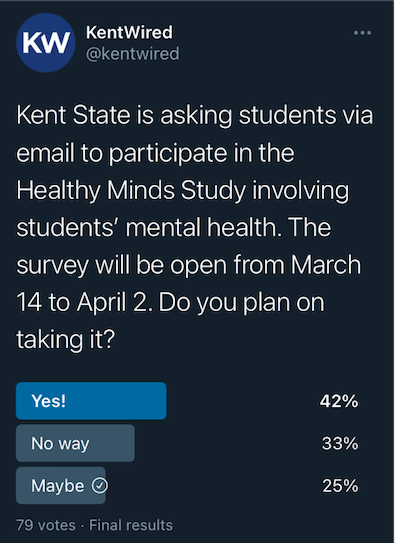Kent State asking students to participate in mental health survey

In a survey conducted on KentWired’s Twitter account, 79 participants voted in whether or not they would be taking the mental health questionnaire. Forty-two percent said they would be participating in the survey, 33 percent voted “no way” and 25 percent of students voted “maybe.”
March 19, 2021
Kent State University is asking all students to participate in the Healthy Minds Study conducted by the University of Michigan. The nationally recognized survey was emailed to students on March 14 and will be open until April 2, giving students three full weeks to participate.
“We really try to do our best to examine the mental health issues that our students experience, be able to translate that into how we support our students and how we provide resources,” said Lamar Hylton, vice president of student affairs.
The survey is intended to better understand students’ mental health, mental health-related issues and sources of support. Some different types of questions students can be expected to answer in the survey include questions about the student’s demographics, mental health history and questions surrounding the racial climate on campus, as well as the impact COVID-19 had on the student’s mental health.
“It’s quite important for us to make sure that we’re not just thinking about a cookie-cutter approach to how we support students, but that we’re able to provide equitable experiences across all demographic categories, race being probably at the top of the list,” Hylton said.
The university last participated in the survey in 2017 which found that nationally, 18 percent of students that took the survey had major depression and 31 percent had an anxiety disorder.
Since then, the COVID-19 pandemic has heightened the awareness of mental health-related issues and increased levels of stress and anxiety according to the Centers for Disease Control and Prevention.
“I think it’s very likely that the levels of psychological distress, whatever that may be, depression, anxiety, substance use, are probably going to be elevated pretty significantly,” said Deric Kenne, associate director for the Division of Mental Health and Substance Use.
The university plans to wait until the results of the survey are published before taking a direct action plan.
“We already have a lot of work underway around mental health, separate and apart from the data that we receive from this particular survey. So, we wait and see what the survey tells us and then how that informs our practice moving forward,” Hylton said.
In a poll tweeted by KentWired, out of 79 people, 42 percent said they would be participating in the survey, 33 percent voted “no way” and 25 percent of students voted “maybe.”
“It’s important for students to really give voice to their experience and this is one of the ways we can do that. It keeps us accountable for shaping programs and services and support that really addresses and meets the needs that are on our campus and at our university,” Hylton said.
Cassidy Gladieux covers mental health. Contact her at [email protected].











